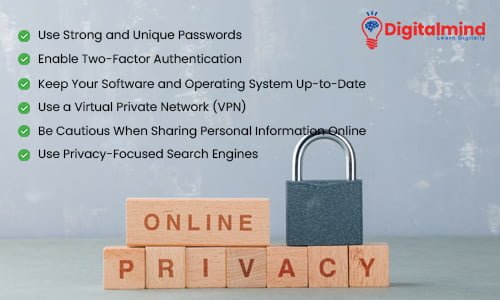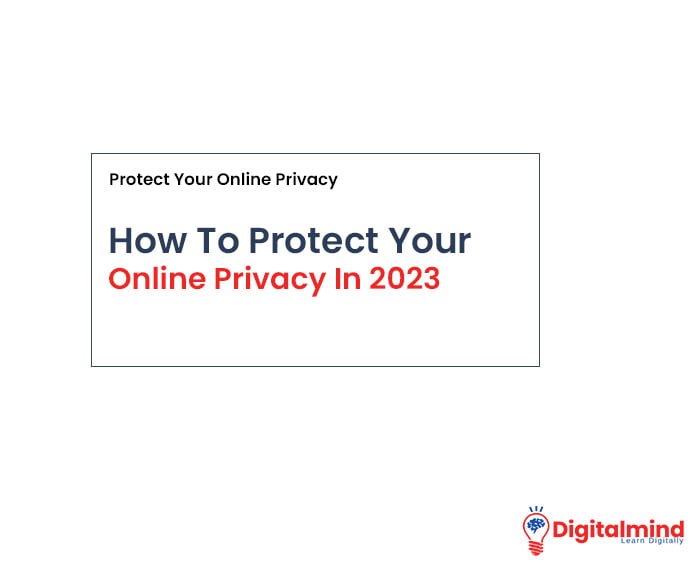some important points about how to protect your online privacy in 2023
- Use a strong and unique password for every online account, and consider using a password manager to securely store them.
- Enable two-factor authentication wherever possible, as it provides an extra layer of security to your accounts.
- Keep your software and operating system up to date to ensure that any security vulnerabilities are patched.
- Use a Virtual Private Network (VPN) when browsing the internet to encrypt your internet traffic and prevent eavesdropping.
- Be cautious when sharing personal information online, especially on social media platforms. Think twice before posting any sensitive information that could be used to identify you.
- Consider using a privacy-focused search engine, such as DuckDuckGo, instead of Google or other search engines that track your search history.
- Use ad-blocking and anti-tracking browser extensions to prevent companies from collecting data on your online activity.
- Check the privacy settings on your social media accounts and adjust them as necessary to limit the amount of personal information that is visible to others.
- Avoid using public Wi-Fi networks for sensitive activities, such as online banking or shopping, as they may not be secure.
- Be wary of phishing scams and other forms of social engineering, and always verify the legitimacy of emails and messages before clicking on any links or providing personal information.

Protecting your online privacy is more important than ever in 2023. With the rise of cyber attacks, data breaches, and identity theft, it is essential to take steps to safeguard your personal information and sensitive data. In this blog post, we will discuss some easy and effective ways to protect your online privacy in 2023
10 Highly Useful Websites for Developers: A Comprehensive List – Learn More
Use Strong and Unique Passwords
One of the most basic and essential ways to protect your online privacy is to use strong and unique passwords for all your online accounts. Avoid using common or easily guessable passwords like “123456” or “password”. Instead, use a combination of uppercase and lowercase letters, numbers, and special characters to create a strong and unique password.
Furthermore, it is recommended to use a password manager to generate and store your passwords securely. A password manager will create and remember complex passwords for you, eliminating the need to remember multiple passwords.
Enable Two-Factor Authentication
Two-factor authentication is an additional layer of security that provides an extra level of protection to your online accounts. By enabling two-factor authentication, you will be required to provide a second form of verification, such as a code sent to your phone or email, to access your account.
Keep Your Software and Operating System Up-to-Date
Make sure you keep your software and operating system up-to-date. This will ensure that any security vulnerabilities are patched, and your computer is protected from the latest threats.
Use a Virtual Private Network (VPN)
Using a Virtual Private Network (VPN) can help protect your online privacy by encrypting your internet traffic and hiding your IP address. This will prevent anyone from tracking your online activity and eavesdropping on your internet connection.
Be Cautious When Sharing Personal Information Online
Think twice before sharing any personal information online, especially on social media platforms. Be careful about the information you share and who you share it with. Keep in mind that anything you post online can be seen by anyone, including potential hackers and cybercriminals.
Use Privacy-Focused Search Engines
Consider using privacy-focused search engines like DuckDuckGo, which do not track your search history or collect your personal information. These search engines are an excellent alternative to Google, which tracks your online activity and collects your data.
Use Ad-Blocking and Anti-Tracking Browser Extensions
Ad-blocking and anti-tracking browser extensions can help prevent companies from tracking your online activity and collecting your data. They can also block annoying ads that slow down your browsing experience.
Check Privacy Settings on Social Media Accounts
Check the privacy settings on your social media accounts and adjust them as necessary. Limit the amount of personal information that is visible to others, and be cautious about accepting friend requests from people you do not know.
The Rise of E-Commerce and Online Shopping Trends – Learn More
Avoid Using Public Wi-Fi Networks
Avoid using public Wi-Fi networks for sensitive activities like online banking or shopping, as they may not be secure. Hackers can intercept your internet connection and steal your personal information.
Be Wary of Phishing Scams
Be wary of phishing scams and other forms of social engineering. Always verify the legitimacy of emails and messages before clicking on any links or providing personal information.
In conclusion, protecting your online privacy in 2023 is essential to safeguarding your personal information and sensitive data. By following these easy and effective tips, you can protect your online privacy and enjoy a safer online experience.

